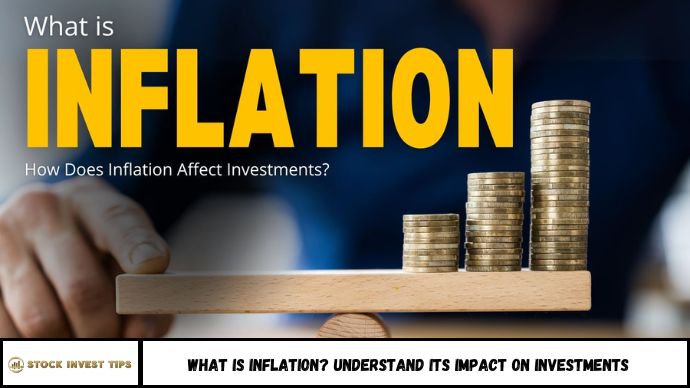Inflation reduces purchasing power over time and plays a critical role in shaping investment strategies. In this beginner-friendly guide, you’ll learn what inflation is, how it works, and how it directly impacts your investments. We’ll explore real-world data, break down complex ideas into simple concepts, and share actionable tips to safeguard your portfolio from inflation’s effects.
Inflation is a key force that shapes the economy, directly impacting the cost of goods and services. It occurs when prices rise over time, effectively reducing the purchasing power of money.”
Why Inflation Should Matter to Every Investor
“Inflation is as violent as a mugger, as frightening as an armed robber, and as deadly as a hitman.” – Ronald Reagan
Inflation might seem like an abstract economic term, but its effects are very real. From higher grocery bills to shrinking retirement savings, inflation eats away at your money silently over time. If you’re investing—or planning to—understanding how inflation works is essential to protecting and growing your wealth.
In this article, you’ll learn:
- What inflation is and why it happens
- How inflation erodes the value of money
- The effect inflation has on stocks, bonds, and other assets
- Strategies to hedge your investments against inflation
Understanding Inflation: The Basics
What Is Inflation?
Inflation is the rate at which the general level of prices for goods and services rises, leading to a decrease in purchasing power.
For example, if the inflation rate is 3%, something that costs $100 today will cost $103 next year.
What Causes Inflation?
There are several drivers of inflation, including:
- Demand-pull inflation – Too much money chasing too few goods
- Cost-push inflation – Rising costs of production (e.g., wages, materials)
- Monetary inflation – Central banks printing more money or keeping interest rates low
2024 Stat: The global average inflation rate was 6.8%, with many developed economies exceeding historical norms (IMF, 2024).
How Inflation Affects Your Investments
1. Inflation Reduces Real Returns
Even if your investment grows, inflation might outpace your returns.
Example:
- Investment return = 5%
- Inflation = 4%
- Real return = 1%
This hidden erosion can significantly impact your long-term financial goals.
2. Impact on Stocks
Stocks are generally considered a moderate hedge against inflation.
- Pros: Companies may pass rising costs to consumers
- Cons: Higher inflation = higher interest rates = lower valuations
Sectors like energy, commodities, and consumer staples tend to perform better during inflationary periods.
3. Impact on Bonds
Bonds are highly sensitive to inflation.
- As inflation rises, bond prices fall because fixed interest payments lose value.
- Long-term bonds suffer the most
- TIPS (Treasury Inflation-Protected Securities) adjust for inflation and offer a safer option
4. Real Estate and Commodities
Real estate and physical assets often shine during inflation.
- Rental income and property values may increase with inflation
- Commodities like gold, oil, and agricultural goods are traditional inflation hedges
2023 Data: Gold rose over 10% during high-inflation months (World Gold Council, 2024).
5. Cash and Savings
Cash loses value quickly during inflation.
- Even high-yield savings accounts rarely keep up with inflation
- Holding too much cash leads to negative real returns
Solution: Keep an emergency fund, but invest the rest strategically.
How to Protect Your Investments from Inflation
1. Diversify Across Asset Classes
- Include stocks, bonds, real estate, commodities, and inflation-protected securities
- Diversification reduces overall risk and improves resilience
2. Invest in Inflation-Resistant Sectors
- Utilities, consumer staples, energy, and real estate often hold value better
3. Consider TIPS or I-Bonds
- Government-issued bonds indexed to inflation
- Offer lower returns than stocks but protect purchasing power
4. Rebalance Your Portfolio
- Review your asset allocation annually
- Shift investments based on economic outlook and inflation forecasts
5. Stay Invested for the Long Term
- Time in the market beats timing the market—even during inflationary periods
- Avoid panic selling during short-term volatility
FAQs
1. What is a good investment during inflation?
Real estate, commodities, and inflation-indexed bonds like TIPS are good inflation hedges.
2. How does inflation affect retirement savings?
It reduces your purchasing power, meaning your savings may not go as far in the future.
3. Is inflation always bad for stocks?
Not necessarily. Some sectors perform well during inflation, but high inflation can lower overall stock market returns.
4. Should I sell investments during inflation?
Not usually. Rebalancing is better than selling everything. Long-term investing often outperforms reactionary moves.
5. How do interest rates relate to inflation?
Central banks raise interest rates to slow inflation, which can affect investment returns and borrowing costs.
6. Can you completely avoid the effects of inflation?
No, but with smart planning, you can minimize its impact and protect your financial future.
Conclusion
Inflation is a reality every investor must face. It silently erodes your money’s value—but it doesn’t have to erode your wealth. By understanding how inflation works and how it impacts different investments, you can strategically protect and grow your portfolio.

